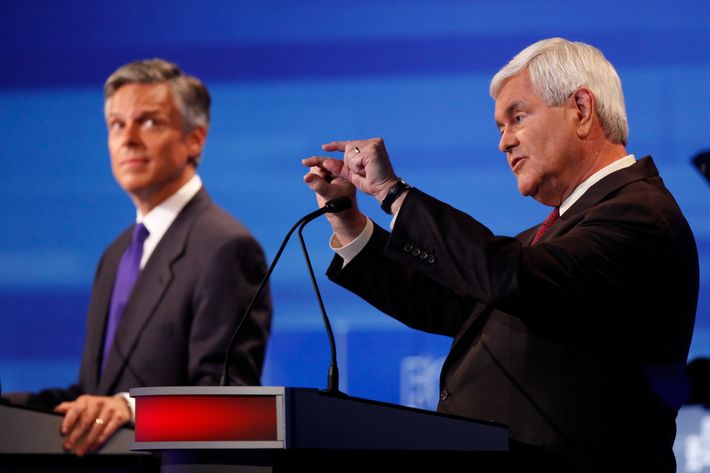
John Kasich is a highly popular governor of a vital swing state, possessed of national experience and long-standing ties to his party’s financial and ideological elite. He is launching a presidential campaign that stands virtually no chance of success, if you define “success” to mean acquiring the nomination. It looks increasingly likely, however, that Kasich defines success as something else altogether.
Kasich began his career in a dissident role. As the Republican Party careened in the 1980s and 1990s toward militant supply-side economics, Kasich carved out an identity as an old-fashioned deficit hawk. Kasich was evangelical on the subject of deficit reduction and conciliatory on the fervent class-war issues that increasingly animated his party. He wanted to cut wasteful defense spending and tax loopholes first, finding a way to square fiscal conservatism with populism.
As the chairman of the House Budget Committee during what was then called “the Republican Revolution,” the frothy period after the GOP took control of the House for the first time in four decades, he tried to steer the revolution his way. He failed. I profiled Kasich in 1998, after his populist ambitions had dissolved into empty platitudes. Kasich was the kind of populist figure his party’s Establishment liked having around — long on folksy slogans, short on substantive disagreement.
Kasich launched an abortive presidential campaign, then headed to Wall Street to make a pile of cash. In 2010, he ran and won an election for governor of Ohio. In that role, he embarked on another foray against party dogma. A 2012 Supreme Court ruling gave states the right to opt out of expanding Medicaid, which was the mechanism Obamacare used to provide coverage to the poorest uninsured citizens. Hatred for Obamacare is a core tenet of Republican doctrine, and conservatives have pressured their party’s elected officials to turn down the Medicaid expansion — even at major cost to their hospitals and state budgets, let alone the health and welfare of their poorest citizens.
Kasich bucked the right and accepted the Medicaid expansion. What made his deviation not just noxious but utterly intolerable to the party base is the rationale he provided. Kasich did not just argue that the state’s budget needed the money. He insisted that denying health insurance to poor people is … wrong:
Ya know, because people are poor doesn’t mean they don’t work hard. Because people are poor doesn’t mean that — it sometimes means they couldn’t pull themselves up by their bootstraps at some point in time. The most important thing for this legislature to think about: put yourself in somebody else’s shoes.”
“Put yourself in the shoes of a mother and a father with an adult child that’s struggling. Walk in somebody else’s moccasins. Understand that, ya know, poverty is real, and that when people are poor… I’ll tell ya somethin’, I had a; I had a comment; I had a conversation with a, one of the leaders… wasn’t one of the leaders, but one of the members of the legislature the other day.”
“I said, ‘I respect the fact that you believe in small government. I do too. I also happen to know that you’re a person of faith. Now, when you die and get to the, get to the, uh, to the meeting with St. Peter, he’s probably not gonna ask you much about what you did about keeping government small, but he’s going to ask you what you did for the poor. Better have a good answer.
Here was a Republican blowing open the moral question that his party was determined to obscure. To be sure, Republicans have different views about what sort of health-care system they would construct in an ideal world, with some preferring to offer modest assistance to some of the poor and sick, and others happy to let them fend for themselves. They usually bury these disagreements in abstract comparisons between their idealized alternative health-care policies and Obamacare, which they all agree is evil and must be repealed. Kasich came face to face with the actual political choice faced by American politicians: whether to support the coverage offered under Obamacare for the poor, or to leave them with nothing. Kasich actually came out and said that taking health insurance away from extremely poor people is immoral.
This was completely beyond the pale, infuriating conservative activists. Kasich has found himself increasingly alienated within the party. He courted supply-siders in New York in March, where he met with a frosty reception. Philip Klein of the conservative Washington Examiner argued, “it will be important for conservative voters to punish him for his expansion of President Obama’s healthcare law in his state.” The Republican health care adviser Avik Roy declared, “The chances of John Kasich marrying Kate Upton are higher than the chances of John Kasich contending for the GOP nomination.”
At this point, Kasich’s only chance at redemption with the conservative base lay in confessing his terrible error and throwing himself upon their mercy — the strategy Marco Rubio has employed, more or less successfully, to atone for his failed attempts to reform immigration law. Instead, Kasich appears to be pursuing the exact opposite approach. Unlike the 1990s, when he slunk quietly away from his failed insurrection back into the bosom of the party elite, Kasich is veering away from it.
He has hired as his chief strategist John Weaver, who has cultivated an even more hostile relationship with the right than Kasich himself. Weaver cut his teeth advising John McCain through his doomed insurgent candidacy in 2000. McCain infuriated the Republican Establishment by uttering what was at the time the maximal heresy — he denounced George W. Bush’s tax-cut plan not only as fiscally irresponsible but as a giveaway to the rich. It was, in other words, a Kasich-esque moral dissent. Weaver stuck with McCain through the first few years of Bush’s term when, alienated by the hostility he had experienced, McCain sided with Democrats on nearly every domestic policy fight.
Weaver went on to advise Jon Huntsman’s flamboyantly moderate 2012 campaign, where he happily expounded upon his belief that Huntsman was the solution to the problem of a party that had lost its mind. “There’s a simple reason our party is nowhere near being a national governing party,” Weaver told Esquire in a 2011 interview. “No one wants to be around a bunch of cranks.”

After Huntsman’s What If We Tried Not Being So Crazy? message predictably crashed and burned, Weaver grew even more despondent about the GOP’s prospects for reconstituting itself as an ideologically mainstream party. “We’re not finished committing suicide here,” he told Jill Lawrence, “We also have the opportunity to kill immigration reform, and the odds are that we will do that, just to make sure we’re the angry-white-man party.” In the same interview, Weaver suggested, in Lawrence’s words, “the party may need a George McGovern-sized defeat with a candidate like Ted Cruz before it chooses another path.”
There are plenty of Republicans who believe that their party must veer back toward the center on economics, or social issues, or both. The overwhelming majority of them, however, go about this project with the utmost caution. They don’t openly challenge the moral foundations of their party’s most sacred pieties. They don’t hire advisers who have described large segments of its base as cranks. They believe in working quietly in the background, rather than having it out in the open.
The drama of Kasich’s campaign lies not in whether he can win, but rather in whether he is willing to lose gloriously, and whether he can attract enough support to force his adversaries to grant him political martyrdom.






























